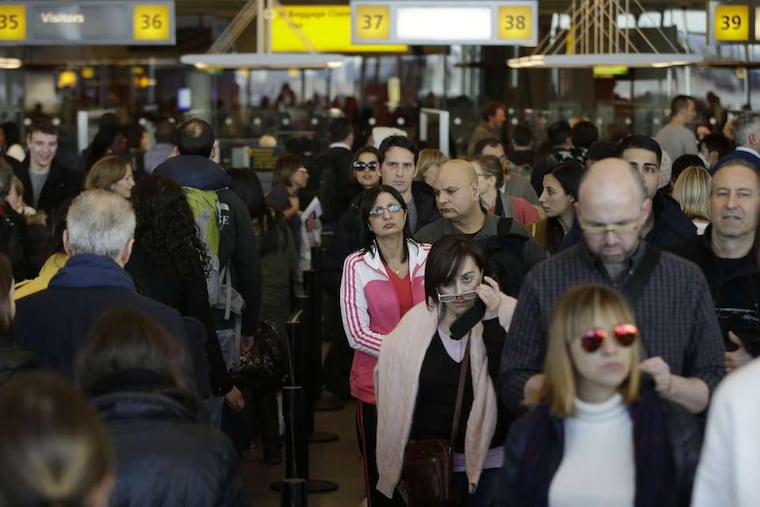TSA estimates record 46 million holiday fliers
"We ask passengers to arrive earlier than usual, don't overpack carry-ons, be prepared to divest items at security checkpoints, listen to advisements from our officers, and most importantly, patience and understanding go a long way," said TSA Administrator David Pekoske.

If you are hankering to be one among millions this holiday, do not bother with the shopping malls, just head to the airport, where nearly 46 million people will mix travel anxiety with Christmas anxiety and a tad of family-get-together anxiety to create a merry little stew of emotions.
The projected number of people who planned to fly between Thursday and Jan. 6 is up more than 5 percent from last year.
"That's an increase of about 126,000 passengers a day," said Nick Calio, CEO of the trade group Airlines for America.
With a daily average of more than 2.5 million people flying, those with the most holiday spirit may enjoy traveling on Thursday, Friday, and Dec. 26, which figure to be the busiest days during the holiday period. (The lightest travel days are Christmas Eve, Christmas Day, and Jan. 5.)
After the busiest Thanksgiving air travel period on record, airlines have promised to work with the Transportation Security Administration to get people to their flights on schedule.
“This holiday season, we are expecting passenger volumes at airports to again be at record highs,” TSA Administrator David Pekoske said. “We ask passengers to arrive earlier than usual, don’t overpack carry-ons, be prepared to divest items at security checkpoints, listen to advisements from our officers, and, most importantly, patience and understanding go a long way.”
With those sentiments in mind, the group AirHelp, which bills itself as the world’s leading flight compensation company, provided a list of protections available to passengers in the United States and other countries.
AirHelp, a for-profit organization that collects 25 percent of the compensation when its customers win claims, says globally, 2018 has been among the worst years when it comes to disrupted flights. Some of that is attributable to the weather, and some is the result of airline issues.
The company says one reason Americans suffer is that 90 percent of them do not know their rights well enough to complain effectively.
"You can always complain when an airline doesn't fulfill the service they've promised. Some might even take your feedback seriously and try to improve their service," AirHelp says in its "10 Commandments of Air Travel."
AirHelp also outlines the rights you have when your flight is overbooked.
“Selling more tickets for a flight than seats available is a common practice in the airline industry,” the company says. “The airline cannot get away with offering you a food voucher as consolation. If you’re bumped and you don’t volunteer to deplane or take another flight, you can be eligible for compensation of up to $1,350, depending on the value of your ticket fare and ultimate delay in arrival to your final destination.”
AirHelp says that on domestic flights, passengers may be entitled to up to twice the cost of a one-way ticket if a flight arrives two hours late and up to $1,350 if it is more than two hours late.
Luggage is less likely to get lost in this era of automatic scanners, but should it happen, AirHelp points to a regulation called the Montreal Convention that says passengers are entitled to compensation if a bag goes astray or is damaged or delayed.
“If your luggage is damaged, make sure to file a report within seven days, and complaints for delayed luggage should be filed within 21 days,” AirHelp says. “Make sure to always hold on to your receipts, because you can be reimbursed for anything that was lost or damaged that you needed for your trip. For example, if you have to buy a suit for an important meeting, you can get reimbursed for the suit so you can replace it.”
AirHelp says fliers don’t need to leave their pets behind, but they should check with the airline so they know exactly what the current rules are, which vary from one airline to the next.
“For example, some airlines only allow assistance or guide dogs to travel in the cabin,” AirHelp says. “Others base their fees on your pet’s size and weight, plus their carrier’s measurements. When making the decision of whether to bring your pet along, you should consider: the size of your pet, the pet carrier, pet/dog carrier fees, the temperament of your four-legged friend, and the airline’s overhead bin space availability.”